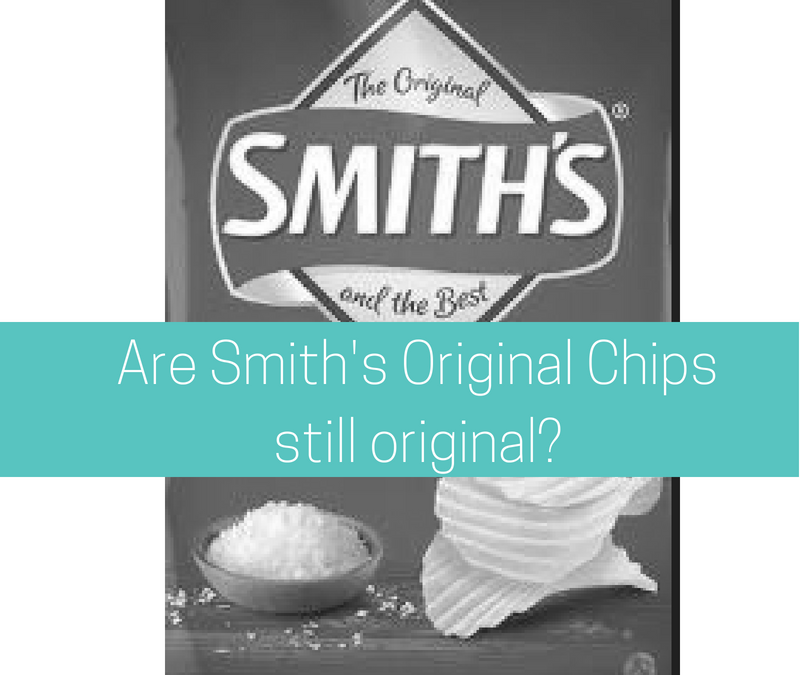Smith’s Chips Original – are they still original?
I brought to the Additive Free Kids community attention that Smith’s Chips – Original Flavour ingredients had recently changed.
I had been caught out again!
It still happens to me occasionally! I never would have expected the old faithful Smith’s chips to change!
I had noticed some very unusual behaviour in one of my youngest boys.
Behaviour that I had not seen in a very long time. Behaviour that had led me to investigate removing additives in the first place!
It has been a very trying few days let me tell you!
I am so THANKFUL that we avoid additives as part of our lifestyle. It brought back home the exact reason why we cannot have them in our diet on a daily basis!!
Racking my brain to work out what had changed, Had I introduced anything new?
Nope, nothing, nada!
There had to be something that hand changed. I went back over the prior few days trying to work out had we had any packaged foods? The only one I could think of was the Smith’s Original Potato Chips. It couldn’t be! The ingredients were so simple and only three!
I went and started investigating (as I do!) and lo and behold, I realised that the ingredients had changed!
The new ingredients were: Potatoes, Canola Oil, Sunflower Oil, Salt, Antioxidants (Tocopherols, Ascorbic Acid, Citric Acid), Rosemary Extract
There was a lot of comments on that facebook post. Some common themes were:
“…citric and ascorbic acid are both used in wine and cooking to change acidity. And rosemary extract from the herb to preserve the oil as well usually. So not really nasty things I don’t think…”
“Most of those additives are just vitamins. There’s nothing to be afraid of…”
“Calm down peeps. Tocpherol = Vitamin E, Ascorbic Acid = Vitamin C, Citric acid = abundant in citrus fruits and naturally produced by the body”
The comments continued in this vain…
All the comments that I read perpetuated what manufacturers think – Citric acid an immediate association with citrus fruit. Rosemary extract an immediate association with rosemary. Sound natural, must be ok for us.
I know the Additive Free Kids Community are seeking a deeper understanding of why I am not happy with these additives being included with the humble Smith’s Original Chip.
Let’s look at the facts.
The ingredients of the Smith’s Original potato chips prior to the change was:
Potatoes, Sunflower Oil, Canola oil, salt
The ingredients since the change are:
Potatoes, Canola Oil, Sunflower Oil, Salt, Antioxidants (Tocopherols), Ascorbic acid, Citric acid), Rosemary extract
So let me take you through my thought process.
Looking at these ingredients immediately, this is what I can see.
For those that aren’t aware, the order of how the ingredients appear in an ingredient list is very important.
The first ingredient represents the largest component of the product and the last ingredient, the least.
This tells me that Smith’s have changed their oil mix around. Previously they used more sunflower oil than canola oil. Now it is the reverse. Often these changes can cause stability issues, especially when we are talking about oils in products.
It is my assumption that by making this change that Smith’s then need to stabilize the product and have felt the need to add additional additives. I hope to hear from Smith’s in the coming days as to the reason behind the change.
Regardless, whatever the reason, the fact remains that these new additives have been added to the product.
Let’s take a deeper look at what these so called vitamins and additives are that I wasn’t impressed with.
Tocopherols
Tocopherols are an antioxidant. They are added to food to help preserve them and assist with the oxidation of fat and oils in foods. They are perceived to be a natural alternative to synthetic antioxidants such as BHT, BHA and TBHQ.
Tocopherols can be produced either by chemical synthesis or by extraction from maize, soy beans, cotton seed, rice or wheat germ oil.
Tocopherols as defined in Chemical Maze (Bill Statham) are:
306 Tocopherols, concentrate, mixed – Vitamin e, may be from wheat germ, rice germ, cotton-see or corn; may be Genetically modified
307 Alpha-Tocopherol – Alpha form of Vitamin E, may be produced by chemical synthesis, may be genetically modified
308 Gamma – Tocopherol – Gamma form of Vitamin E; may be produced by chemical synthesis; may be genetically modified
309 Delta – Tocopherol -Delta form of Vitamin E , may be synthetic, may be genetically modified
As you know, I haven’t heard back from Smith’s yet. I haven’t been able to ask them any questions regarding the ingredients used.
The reality is I don’t know which Tocopherols have been used, whether they are natural or synthetic.
What we need to understand is that most of the vitamins that you will find on store shelves and those used to fortify out food are synthetic.
We need to understand the difference between natural vitamins and synthetic vitamins.
In nature, vitamins always come with a complex with co-factors and co-enzymes. They never come as one fractionated part of a vitamin. Research has shown that the human body strongly discriminates between natural and synthetic Vitamin E.
I had so many comments on the Facebook post commenting – why are you complaining that the potato chips have been fortified with vitamins?
I prefer to get my vitamins from food that are present in their whole complex state, that my body knows how to use. Not fractionated vitamins, not synthetic vitamins.
Given the price point of Smith’s chips, my money is on tocopherols are synthetically produced.
I look forward to hearing the facts either way when I hear back from Smith’s.
Citric acid and ascorbic acid
Vitamins can be called natural even if they have been made in a laboratory.
Vitamin C is usually made in a factory or lab from starch and is the result of a two step fermentation process.
As starch is natural, the vitamin can be called natural. However, it hasn’t come from oranges or lemons as most people presume. Scientists will argue that the starch based Vitamin C and the orange juice Vitamin C are the same.
They appear to have the same molecular structure. The biochemists will argue that vitamin C in animals is made from carbohydrates anyway and that the product is clinically effective.
The actual molecular construction process is NOT the same.
A new study on Vitamin C (Am J Clin Nutr; Jan 2008) showed adults taking the synthetic version of Vitamin C had serious side effects.
Dose of 1,000 mg of Vitamic C a day impaired their energy systems, specifically weakening the mitochondria of the cell and significant adverse effects on the antioxidant system. Children are usually more vulnerable.
Chemical Maze defines Citric acid as:
“330 – Citric acid – is usually made by the fermentation of molasses by Aspergillus niger or from corn. It may contain MSG or free glutamic acid if made from corn, may be Genetically modified – as defined in Chemical Maze. “
Aspergillus niger is a type of mould, a strain of black mould.
It is much cheaper to produce it this way than natural version.
The mould culture is then fed sugar solutions which are often derived from corn.
Many people that react to foods containing citric acid could be sensitive to the mould or the corn used to produce the acid.
Citric acid symptoms can include:
- mouth ulcers or rashes
- gastrointestinal problems like abdominal pain, bloating or diarrhea
- swelling of the mouth or throat
- headaches
My children are sensitive to citric acid, having suffered with mouth ulcers, rashes and abdominal pain. I have had similar reports from my clients in the past.
This is why I choose to avoid Citric acid and recommend that others do to, especially if they are sensitive to MSG.
Chemical Maze defines Ascorbic acid as:
“300 – Ascorbic acid – may be synthetic or from glucose, may be genetically modified. “
For some individuals they may experience diarrhea, nausea, vomiting or abdominal cramps / pain.
A pretty benign additive, however I still prefer to obtain my vitamins from nature, not synthetically produced.
Rosemary extract
Rosemary extract sounds very natural.
Most consumers believe it is just rosemary or just derived from rosemary.
As Joanna Blythman (author of Swallow This) states, rosemary extract is a clean label for the antioxidant butylated hydroxyanisole (BHA) and Butylated Hyrdroxytolulene (BHT) also known as 320 and 321
Numbers that the Additive Free Kids community would recognise, know well and seek to avoid.
Why?
BHA and BHT are antioxidants that are petroleum derived and can result in the following potential effects:
- asthma
- insomnia
- fatigue
- chronic uticaria (hives)
- prohibited in foods for infants
- aggressive behaviour
- migraines
- suspected carcinogen
Definitely not something I would like my children ingesting with their potato chips.
Rosemary extract has had huge growth with many healthier food labels opting to use it. The additive provides them with the preservation function it is looking for and at the same time gives the consumers confidence that it sounds natural.
Not the case I am afraid.
I learned this one the hard way with my children also.
If you or your family members are suffering from health or behavioural issues, perhaps it is time to review the amount of additives in your diet?
Check out our 6 week Pantry Reset program where I coach you through the transition, equip you with the knowledge and fast track your family favourite meals. Find out more below.




 My passion and mission is to work with families to reduce the overwhelm when going additive free. Moving to additive free living can bring back peace, calm and joy to families. I know it's possible and I've experienced it first hand with my 5 boys.
My passion and mission is to work with families to reduce the overwhelm when going additive free. Moving to additive free living can bring back peace, calm and joy to families. I know it's possible and I've experienced it first hand with my 5 boys.




Wow wow wow!!! Thanks for bringing attention to this. I buy these chips believing the simple ingrediants are ok for my kids. I always have them stashed out of sight in the pantry for days when the fridge is bare or picnics and road trips. I just don’t understand how it can be legal for companies to put these things on the shelf. I get its consumer choice to purchase etc but it seems so sneaky.
You are welcome. You are right most consumers wouldn’t be checking the ingredients all the time.
Omg that is shocking. So glad i read this article.
Thank you so much for sharing your findings. I too hot caught out with the faithful Smith’s chips which used to taste awesome and have been compromised. In my case I had a massive hives outbreak and will not be purchasing again
Hi Nectaria
You are welcome. So sorry to hear that you had this reaction though! I do recommend contacting them and advising them of your reaction. Only this way will we get change.
Kindest regard
Frankie
When i found out Smith’s had decided to alter their ingredients and add nasty stuff, i moved over to Aldi’s Sprinter Original chips. Their chips were just as good if not better than Smith’s. Unfortunately they too have now gone and changed their ingredients with the same antioxidants and preservatives as Smith’s. I think it has something to do with using cheaper oil, possibly from overseas, but as it is too hard to get any answers from both Smith’s and Aldi, who knows!
Looks like i’ll have to hunt around for potato chips which are just that, potato, oil and salt, can’t believe that more and more companies are adding synthetic rubbish to foods when we should all be moving over to a low chemical foods, very frustrating. What’s worse is that the government allows it to happen in that when an ingredient changes they don’t have to advertise it, so you end up buying the food to later find out you shouldn’t be eating it AND that they can use such naming as Rosemary Extract which sounds fine, but is actually a man made chemical.
Hi Paul
I haven’t reviewed any of the Aldi products. It is a shame to hear that they have also changed over their oil. Have you tried The Natural Chip co and Kettle Chip company plain potato chips? I confirmed these with the manufacturers recently. It is so frustrating! The ingredients are CONSTANTLY changing. Thank you for your comment. Frankie
Thank you so much for researching this, plain chips used to be the only snack food I could eat but no more, and I am shocked that the friendly sounding rosemary extract is not made from rosemary, and angry they get away with this!!! I am about to contact Smiths via Facebook, and also spread the word…
You are most welcome!
I also noticed a strange taste, felt unwell, checked the ingredients and will now be buying another brand. It is really disappointing that the few items available to allergy sufferers are constantly shrinking
It is sad isn’t it. I am so passionate about connecting amazing manufacturers that use wholesome ingredients with our community. Stay tuned!
Only recently noticed the difference. Such a shame to lose another food
It is sad!
The worse part is, as someone with type 2 Diabetes, I used to find that having some Smith’s Chips actually lowered it for me.
Since the change to Canola Oil, my BGL’s post consumption jump, and I get headaches, and dizziness.
I have since determined that I am now sensitive (not allergic)(yet) to Canola Oil.
It might be lower if so called fats, but it uses preservatives like you wont believe as raw Canola Oil goes off in 3 days.
It was very sad to see the change in ingredients. I have tried them since also when out and have also experienced the headaches as a result.
Flavour enhancer 621 is msg, contradictory to Smiths info, 621 is everywhere in their foods.
Is Rosemary extrac also called number 392? Or is that a different thing to petroleum derived 320 and 321?
Apologies for the delay! Rosemary extract is also known as E392. My understanding is that it is different to E320 and E321.
Great to read your article. I seldom eat chips but in the last fornight had half a pack and then another week later only 3 potato chips and came up with a terrible itch that lasted 3 hours. I initially had coughing for 10 minutes and took ventalin, then raised hives and itchy ears and closed nasal passage.
Thanks for your comment. Sorry to hear that you had those reactions. I invite you to report these symptoms to the manufacturer. If they receive enough complaints, perhaps they will switch back. Let me know if you need assistance. Let me know how you go
Frankie
x
I am so glad I read your article. Thank you for your insight. I usually do not comment, only read but this concerns my & other peoples’ health. I have suffered with IBS & milk intolerances for most of my life and a few years ago developed adrenal problems. Consequently, I have now been diagnosed with Multi-Chemical Sensitivity. I have noticed lately my favorite Thinly Cut Orig. Chips taste funny & make me feel sick & itchy. I looked at the ingredients & found the new changes. NOT HAPPY ! I only eat Original because flavorings make me sick. PLEASE advise your followers to NOT just give up & change brands. CONTACT Smith’s, voice your concerns, ask them to remove the additives. My Dad used to say, “It’s the SQUEAKY wheel that gets the grease”. If enough people complain & threaten to change brands, they may listen. There is a Consumer Enquiries number on each pack. It is: 1 800 025 789. I will be ringing it tomorrow. There’s such a thing as Power OF the People. We have a right to have safe, enjoyably edible food . God Bless people like you that share your knowledge.
Hey Linda
Thank you so much for taking the time to comment, it is important 🙂 I completely agree with you in terms of contacting the manufacturer. The manufacturer wasn’t interested and sometimes the quickest way to get their attention is to hit their bottom line. People voting with their dollar is the quickest way for a manufacturer to take notice. Thank you for posting the consumer enquiries number, I do recommend our community also get in touch to notify them, that they will no longer be supporting their brand.
We do all have a right to have safe enjoyable, edible food!
Frankie
I found this article by googling the chips and trying to find more information about the ingredients because I’ve just put two and two together that eating these has given me a terrible tight feeling in my chest. It’s the second time it’s happened, and I’d thought the first time that it surely couldn’t have been the chips because the ingredients list looked pretty good at first glance. No numbers. And Antioxidants are good for us, right? But the second time I’ve had this reaction and the chips were eaten again. This article is great – very informative – thank you!
I am so glad it was able to assist you!
I am suffering an asthma attack (despite being on twice daily preventer) after a little Smiths Original Crisps binge on Sunday night.I’m pretty sure this is why 😖
Thank you for sharing your experience Cath. Hope you are ok x
I am addicted to chips…I have a big packet every day….until today…no more ….I feel as though Im creating a terrible problem with my heart….its the only thing I consume that is not natural food and boy oh boy my heart has been beating a disco drum in my chest for some time now….cant be sure if its all related but I have been through a battery of tests and they cant seem to find the cause but they can see the palpitations.
Keep a diary of what you are eating and the symptoms. I have experienced this also. Had the full battery of tests and my heart was absolutely fine. I was experiencing Tachycardia. The only other reason was food that I had consumed out over that period of time.